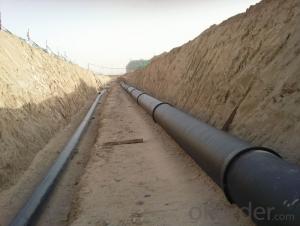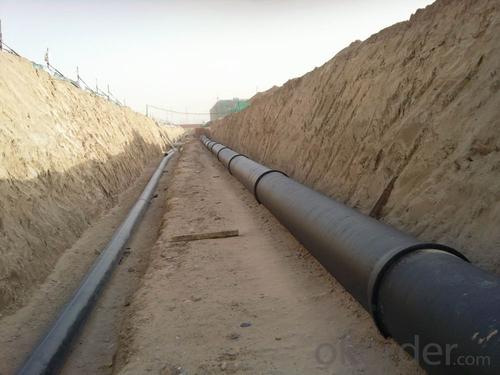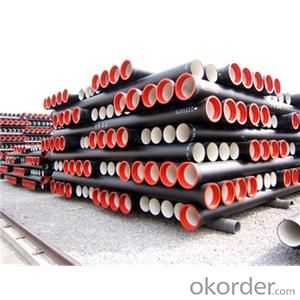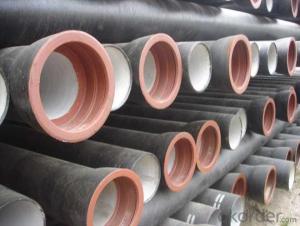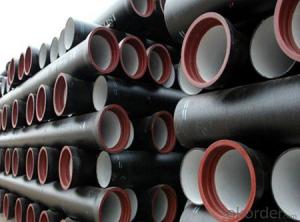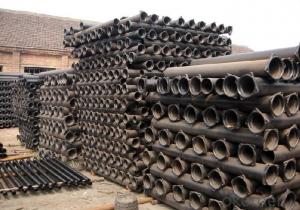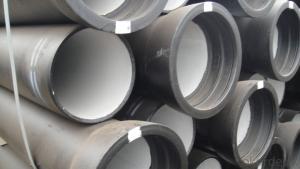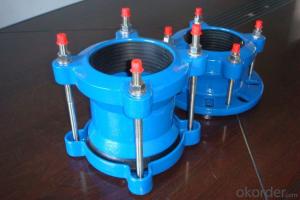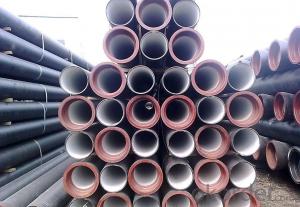Ductile Iron Pipe ISO2531:1998 DN900 On Sale
- Loading Port:
- China main port
- Payment Terms:
- TT OR LC
- Min Order Qty:
- 999 m
- Supply Capability:
- 9999 m/month
OKorder Service Pledge
OKorder Financial Service
You Might Also Like
1,Ductile Iron Pipe Description :
1) we can do third party inspection according to customer's request.
2)Our products have been sold to many international market, such as Middle East and South East Asia and Africa.
3)Pipes confirm to ISO2531,K9 class,T type joint,6m long,with inside cements lining conform to ISO4179, outside Zinc spraying(130g/m2) and bitumen coating(70μm) conform to ISO8179.
4)Pipe ends: Spigot and socket ends, with 100% SBR rubber gaskets accoding to ISO4633
2,Main Features of the Ductile Iron Pipe:
1. Material: Ductile iron grade 500-7/ 450-10 in accordance with ISO1083
2. Standard: ISO 2531, EN545, EN598, ANSI, AWWA
3. Certificate: ISO9001, ISO14001, SGS, NSF, WRAS
4. Test: In accordance with ISO 2531 / EN 545 / EN598 and 100% water pressure test
5. Length: 6m or cut into 5.6m, 5.7m, 5.8m
6. Internal Lining: Cement, conform to ISO4179
7. External coating: Zinc + Bitumen, conform to ISO8179
8. Rubber: NBR, SBR, EPDM according to ISO4633 / EN681.1
9. Note: The gaskets, bolts & nuts are supplied respectively as your special requirement
3,Ductile Iron Pipe Images:
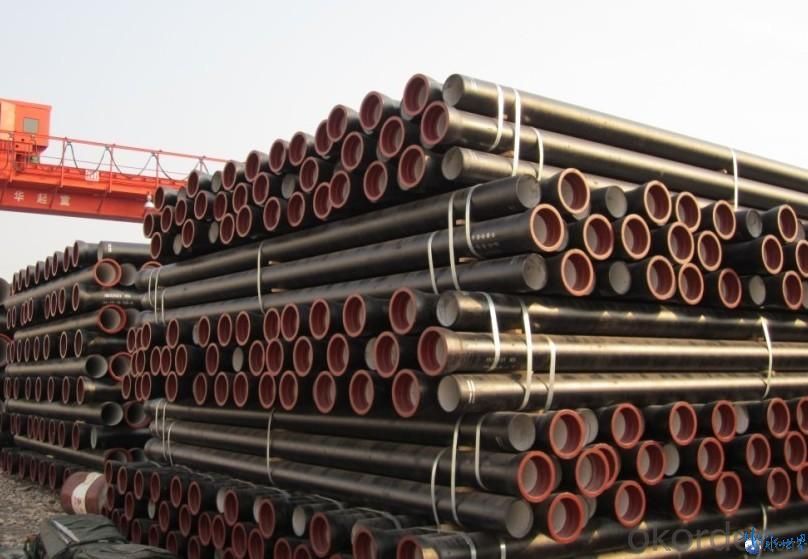
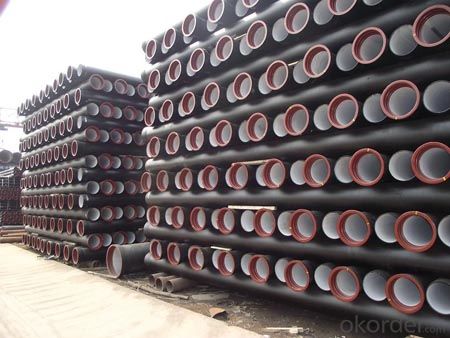
4. Ductile Iron Pipe Specification
Standard: API SPEC 5L 44th eidtion,ASTM A252-98(2007)
Grade: A53 Grades A/B, ASTM A106 Grades B/C,ASTM A179
AWWA, C200, ASTM A139, ASTM A120, API 5L Grade B
X42, X52, X56, X60, X65, X70, X80, X100
Weld Alternatives: LSAW
OD size range: 6.4~44.5mm
Wall thickness: 406.4~1422mm
Length: 3 - 12 m according to requirment
Note: Other grade can also be provided after consulting. Special design are available
for coal slurry conveyance LSAW line tube -- Service
5.FAQ:
We have organized several common questions for our clients,may help you sincerely:
1.Q: Why would you choose ductile iron pipe rather than other pipe materials?
A:The reasons are obvious for that not only ductile iron pipe possesses the inherent strength and flexibility of ductile iron, combined with proven corrosion protection systems, but also the cost savings can be achieved from design to installation and commissioning.
2.Q:Why can you guarantee the inner of pipes can’t be corroded?
A: High alumina cement mortar lining and sulphate-resistant cement mortar lining. These two special linings are applicable to inner anti-corrosion for sewage pipes, improving resistance to erosion of the sewage components.
- Q: Can ductile iron pipes be used for mining applications?
- Yes, ductile iron pipes can be used for mining applications. Ductile iron pipes are known for their strength, durability, and resistance to corrosion, making them suitable for various industrial purposes, including mining. Their ability to withstand high pressure and handle heavy loads makes them ideal for transporting water, slurry, and other materials commonly used in mining operations. Additionally, ductile iron pipes have a long lifespan, reducing the need for frequent replacements and maintenance in mining environments.
- Q: How does ductile iron pipe perform in seismic conditions?
- Ductile iron pipe has excellent performance in seismic conditions due to its inherent flexibility and strength. It can withstand ground movements and vibrations caused by earthquakes without fracturing or breaking. Its ability to absorb and dissipate energy helps prevent catastrophic failures and ensures the integrity of the pipeline system. Additionally, ductile iron pipe's corrosion resistance and durability make it a reliable choice for long-term performance in seismic-prone areas.
- Q: Can ductile iron pipe be used for high-pressure gas systems?
- Yes, ductile iron pipe can be used for high-pressure gas systems. Ductile iron pipe is known for its high strength and durability, making it suitable for applications that require high-pressure systems. It possesses excellent mechanical properties, including high tensile strength, yield strength, and impact resistance, which allow it to withstand the pressures associated with gas transmission. Furthermore, ductile iron pipe is resistant to corrosion, making it a reliable choice for long-term use in high-pressure gas systems. However, it is important to consider the specific requirements and regulations of the gas system, as well as consult with industry professionals, to ensure that the ductile iron pipe is installed and maintained correctly for optimal safety and performance.
- Q: What are the typical joint restraint requirements for ductile iron pipes?
- Ductile iron pipes typically require joint restraints to prevent separation or pulling apart. Two common types of restraints are mechanical joint restraints and push-on joint restraints. Mechanical joint restraints are used when the pipe faces high internal pressures or external loads. They consist of a gland and a follower gland that are tightened around the joint with bolts or clamps. This secures the joint and prevents movement. On the other hand, push-on joint restraints are used when the pipe doesn't face high pressures or loads. They provide a seal and prevent separation due to ground movement or external forces. Push-on joint restraints are installed by pushing the pipe into the joint and securing it with a ring or collar. In addition to joint restraints, proper bedding and backfill materials are important for ductile iron pipes. These materials help distribute loads and provide stability, further enhancing the pipe's resistance to joint separation. It's important to note that the specific joint restraint requirements may vary depending on project specifications, pipe size, and operating conditions. Therefore, consulting the manufacturer's recommendations and engineering standards is essential for selecting and installing the proper restraints.
- Q: What is the expected service life of ductile iron pipe?
- The expected service life of ductile iron pipe can vary depending on various factors such as the environment, soil conditions, water quality, and the level of maintenance and corrosion protection measures implemented. However, on average, ductile iron pipe is designed to have a service life of 75 to 100 years. This is due to its superior strength, durability, and resistance to corrosion. Ductile iron pipe is known for its ability to withstand harsh conditions and has been used extensively in water and wastewater systems, industrial applications, and other infrastructure projects. Regular maintenance and proper corrosion protection can further extend the service life of ductile iron pipe, ensuring its continued reliability and performance over many decades.
- Q: What are the specifications for the installation of water ball iron pipes?
- The T type interface pipe shall be supported by a pier in the vertical or horizontal direction. The size of the pier should be calculated according to the factors such as pipe diameter, angle of rotation and working pressure. 4, the transmission of drinking water, the pipeline should not pass through the poison contaminated areas, such as the need to pass through, should take protective measures.
- Q: How does ductile iron pipe resist internal corrosion?
- Ductile iron pipe resists internal corrosion through a combination of its unique material properties and protective coatings. Firstly, ductile iron, also known as nodular cast iron, is made by adding magnesium to molten iron, which causes the graphite in the material to be nodular or spherical in shape. This results in a more flexible and elastic material compared to traditional cast iron, making it less prone to cracking or fracturing under stress. Additionally, ductile iron has a dense, microstructure with a high carbon content, which acts as a barrier to prevent corrosive elements from penetrating the pipe's surface. This inherent resistance to corrosion makes ductile iron pipe suitable for carrying various fluids such as water, sewage, and chemicals without the risk of degradation over time. Furthermore, ductile iron pipes are often internally lined with protective coatings to further enhance their resistance to corrosion. These coatings, such as cement mortar or epoxy, create a barrier between the pipe's surface and the fluid it carries, preventing direct contact and reducing the likelihood of corrosion. These linings are applied during the manufacturing process, ensuring a consistent and durable protection throughout the entire length of the pipe. In summary, ductile iron pipe resists internal corrosion due to its material composition, including the nodular graphite structure and high carbon content, as well as the application of protective coatings. This combination of factors ensures the longevity and reliability of ductile iron pipes in various applications, even in corrosive environments.
- Q: What are the different corrosion protection options for ductile iron pipe?
- There are several corrosion protection options available for ductile iron pipes. These include internal linings such as cement mortar or polyethylene encasement, external coatings like zinc or polyethylene, and cathodic protection systems. Each option offers varying levels of protection and is chosen based on the specific needs and conditions of the pipe installation.
- Q: Are ductile iron pipes suitable for installation in rocky or hard soil conditions?
- Yes, ductile iron pipes are suitable for installation in rocky or hard soil conditions. Ductile iron pipes are known for their strength and durability, making them well-suited for challenging soil conditions. Their high tensile strength allows them to withstand external loads and pressures, including the presence of rocks or hard soil. Additionally, ductile iron pipes are resistant to corrosion, which further enhances their suitability for installation in such conditions. The pipes' flexibility and ability to withstand bending stresses also make them a reliable choice for rocky or hard soil conditions, as they can accommodate ground movement without compromising their structural integrity. Overall, ductile iron pipes are a preferred option for installations in challenging soil conditions due to their robustness, longevity, and resilience.
- Q: Are ductile iron pipes resistant to UV radiation?
- Ductile iron pipes do not possess resistance against UV radiation. The exposure to UV radiation can lead to the deterioration and weakening of the material as time goes by. In order to safeguard ductile iron pipes from UV radiation, they must be covered or enveloped with a UV-resistant substance or coated with an appropriate protective layer. Furthermore, it is essential to conduct regular inspections and maintain the pipes adequately to identify and rectify any indications of UV damage.
Send your message to us
Ductile Iron Pipe ISO2531:1998 DN900 On Sale
- Loading Port:
- China main port
- Payment Terms:
- TT OR LC
- Min Order Qty:
- 999 m
- Supply Capability:
- 9999 m/month
OKorder Service Pledge
OKorder Financial Service
Similar products
Hot products
Hot Searches
Related keywords
